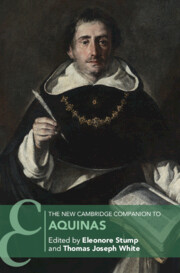Book contents
- The New Cambridge Companion to Aquinas
- Other Volumes in the Series of Cambridge Companions
- The New Cambridge Companion to Aquinas
- Copyright page
- For our teachers
- Contents
- Contributors
- Abbreviations
- A Select List of Aquinas’s Works
- Introduction
- Part I Life and Works
- Part II Metaphysics and the Ultimate Foundation of Reality
- 2 First Principles
- 3 Essence and Existence, God’s Simplicity and Trinity
- 4 Goodness and Being, Transcendentals, Participation
- 5 The Metaphysics of Creation
- 6 The Nature of Human Beings
- Part III Epistemology
- Part IV Ethics
- Part V Philosophical Theology
- Bibliography
- Index
- Other Volumes in the Series of Cambridge Companions (continued from page ii)
5 - The Metaphysics of Creation
Secondary Causality, Modern Science
from Part II - Metaphysics and the Ultimate Foundation of Reality
Published online by Cambridge University Press: 30 July 2022
- The New Cambridge Companion to Aquinas
- Other Volumes in the Series of Cambridge Companions
- The New Cambridge Companion to Aquinas
- Copyright page
- For our teachers
- Contents
- Contributors
- Abbreviations
- A Select List of Aquinas’s Works
- Introduction
- Part I Life and Works
- Part II Metaphysics and the Ultimate Foundation of Reality
- 2 First Principles
- 3 Essence and Existence, God’s Simplicity and Trinity
- 4 Goodness and Being, Transcendentals, Participation
- 5 The Metaphysics of Creation
- 6 The Nature of Human Beings
- Part III Epistemology
- Part IV Ethics
- Part V Philosophical Theology
- Bibliography
- Index
- Other Volumes in the Series of Cambridge Companions (continued from page ii)
Summary
When it comes to God’s creation of and interaction with the universe, it has sometimes been suggested that Christian revelation tells us nothing about the world and its origins, restricting itself to questions of value and not to matters of fact.1 Thomas Aquinas, by contrast, argued that a false account of creation implies false opinions about God.2 Aquinas consistently held that there were a number of truths about the creation of the universe that are central to Christian revelation: first, the truth that the world causally depends on God for its existence and all of its operations. Given the way in which Aquinas conceives of this dependence, this first truth implies that the universe is guided by God’s intelligent ordering or providence. The second truth is that God created the world with no constraints of any kind, including the necessity of creating from pre-existing matter, the necessity of employing causal intermediaries, or a necessity imposed by his reasons (such that he was not free to do otherwise). The third is that the universe was created in time: that is, having a definite beginning in the finite past. Of these three central truths about creation, Aquinas held that only the third is a revealed truth strictly inaccessible to human philosophical discovery, whereas the first and second are truths for which we can give conclusive, independent philosophical demonstrations even though they are also taught by Scripture. Beginning with his theological motivations, I will explain Aquinas’s commitments in regard to God’s creation, the universe’s dependence upon God, and its beginning in time.
- Type
- Chapter
- Information
- The New Cambridge Companion to Aquinas , pp. 107 - 125Publisher: Cambridge University PressPrint publication year: 2022

